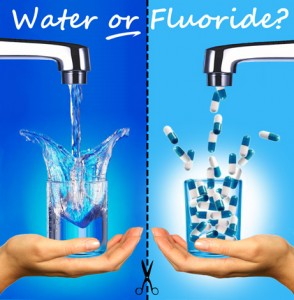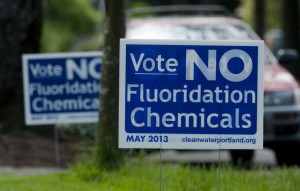 Portland voters voted against adding fuorosilicic acid to their water supply, despite overwhelming odds, and continue to maintain their status as the largest city without fluoridated water. Pro-fluoride advocates marked the day as a defeat for public health. Anti-fluoride advocates rejoiced (for the fourth time since 1956) in the freedom of choice.
Portland voters voted against adding fuorosilicic acid to their water supply, despite overwhelming odds, and continue to maintain their status as the largest city without fluoridated water. Pro-fluoride advocates marked the day as a defeat for public health. Anti-fluoride advocates rejoiced (for the fourth time since 1956) in the freedom of choice.
The 61 percent of citizens voting down the measure included the Pacific Green Party, the Oregon Progressive Party, the Organic Consumers Association, the Oregon Association of Acupuncture and Oriental Medicine, and the Cascade Policy Institute – strange bedfellows indeed [link].
Assuming fluoride is not harmful to the human body there is no excuse – not even the fact that fluoride is proven to prevent tooth decay – for mandatorily medicating a population. Vaccines used to prevent communicable diseases are not even mandatory by law but, rather, are required by state law only if one chooses to take advantage of state resources such as public education. Public health prevention should be tempered through policies that are not invasive to the individual body. Mass medication of this type straddles an Orwellian line the Portland citizenry has firmly rejected.
Healthy Kids, Healthy Portland and the pro-fluoride campaign, outraised their opponents 3-1 and still came up short at the end of the day, demonstrating democracy, at a local level, is alive and well in Portland. The government shared the support of fluoridating the city’s water supply, a move that would align Portland with the majority of large communities in the United States and would have a centralizing effect in consolidating power under agencies such as the Center for Disease Control. Keeping itself relevant is a primary reason for the government’s support of the measure. However, relevancy at the expense of additives to the water supply, a public resource, is a high price to pay.
Currently, Portland schools, through ViDA (Vision, Dental, and Audiometric screening program), offer a daily fluoride tablet program that provides fluoride upon request to students and their families at no cost. This program respects the choice that families should have in providing their children a substance that is harmful if ingested in certain amounts. Actions such as these are within the government’s prerogative of response to so-called dental epidemics as is education about proper health and dental care and providing students healthy, non-sugary vending and meal options at schools.
Truth be told, there are a multitude of options at the government’s disposal to address tooth decay that would preserve choice and could be much more cost effective than building a five million dollar facility with an annual operating budget in the hundreds of thousands. Switzerland uses fluoridated salt, thus preserving citizens’ choice by having non-fluoridated salt available. In Japan, a country that does not fluoridate its water, public health advertisements have normalized tooth-brushing after every meal such that students, teachers, and those in the workplace may be seen brushing their teeth in public and school restrooms around mealtimes.
The voting results marked the defeat of a measure that threatened Portlanders’ choice, unique cultural status, and clean water supply. Despite five commissioners and nearly every major city newspaper advocating for the Measure and despite being out-funded, Portlanders spoke with the loudest voice. No matter which way one falls in the fluoride debate, the defeat of Measure 26-151 is a victory for the city’s democratic process.
Taking the Lead on Water
When it comes to water, Portland should be the leader, not the follower. Oregon is renowned for its mountain waters that melt from clean winter snows off of the peaks of the Cascades. Now, the largest city in the state is set to vote in a special election on May 21 whether it will add fluorosilicic acid to its public waters. Portland is the largest city in the United States that does not fluoridate its public drinking water.
Nick Fish, Commissioner for Public Works, who played a significant role in advocating for fluoridation in Portland, has made clear his stance on the issue. His August 16, 2012 statement declared that cities save an estimated $38 in dental costs for every $1 toward the public fluoridation process. This seems to cry far from the truth where public schools already provide fluoridation treatments for their students and countless topical fluoride products may be found at any local store.
During a time when water and sewer rates are increasing drastically, despite across-the-board city budget cuts outlined just days ago, it is an exercise in wonder to find Portland’s commissioners touting the construction of a $5 million facility [Portland Water Bureau] with a $575,000 per annul operating and chemical cost. Especially considering there are so many less expensive and more targeted approaches to preventive periodontal care.
Furthermore, the city has paid scant attention to fluorosilicic acid’s effects on the environment. The Sierra Club has urged voters against the passage of adding fluoride to Portland’s public waters because of negative effects on salmon and aquatic life [Sierra Club Opposes Portland Water Fluoridation Measure 26-151]. Would adding more of this acid contribute to the already rapid acidification occurring on our oceans’ surfaces (a 30% increase since the dawn of the Industrial Revolution [Arctic Ocean ‘acidifying rapidly’].
Consumer choice and the ethical considerations of mass medication are strong arguments in favor of rejecting the Commissioner Fish’s proposal to fluoridate Portland’s public waters. There are currently no federal laws requiring vaccination [CDC State Vaccination Requirements] of children (however, many states require such vaccination before enrolling at public schools). Why should a citizen be forced to choose between buying bottled water and subjecting their children to ingestion of a chemical intended for topical use only? The proposal restricts our choice and is unethical to the extent that it is an attempt to mass medicate a population. We don’t even make such requirements of our vaccines.
Portland may be the largest city in the United States not to fluoridate its water. However, entire countries have banned the practice of fluoridating their public water altogether. Japan, the world’s third largest economy, ceased fluoridating its water in the early 70s, as did Sweden. Finland, Germany, and Czechoslovakia stopped the practice in the 90s. Their ministers have cited all of the above arguments for imposing fluoridated water on their populations.
As the proposal is set for a vote, citizens should consider not whether they believe there are health benefits or not to adding fluoride to our water but whether these benefits can be achieved through measured and responsible administration that respects the realm of parents and respects citizens’ consent. Citizens should consider Portland leading the way.
